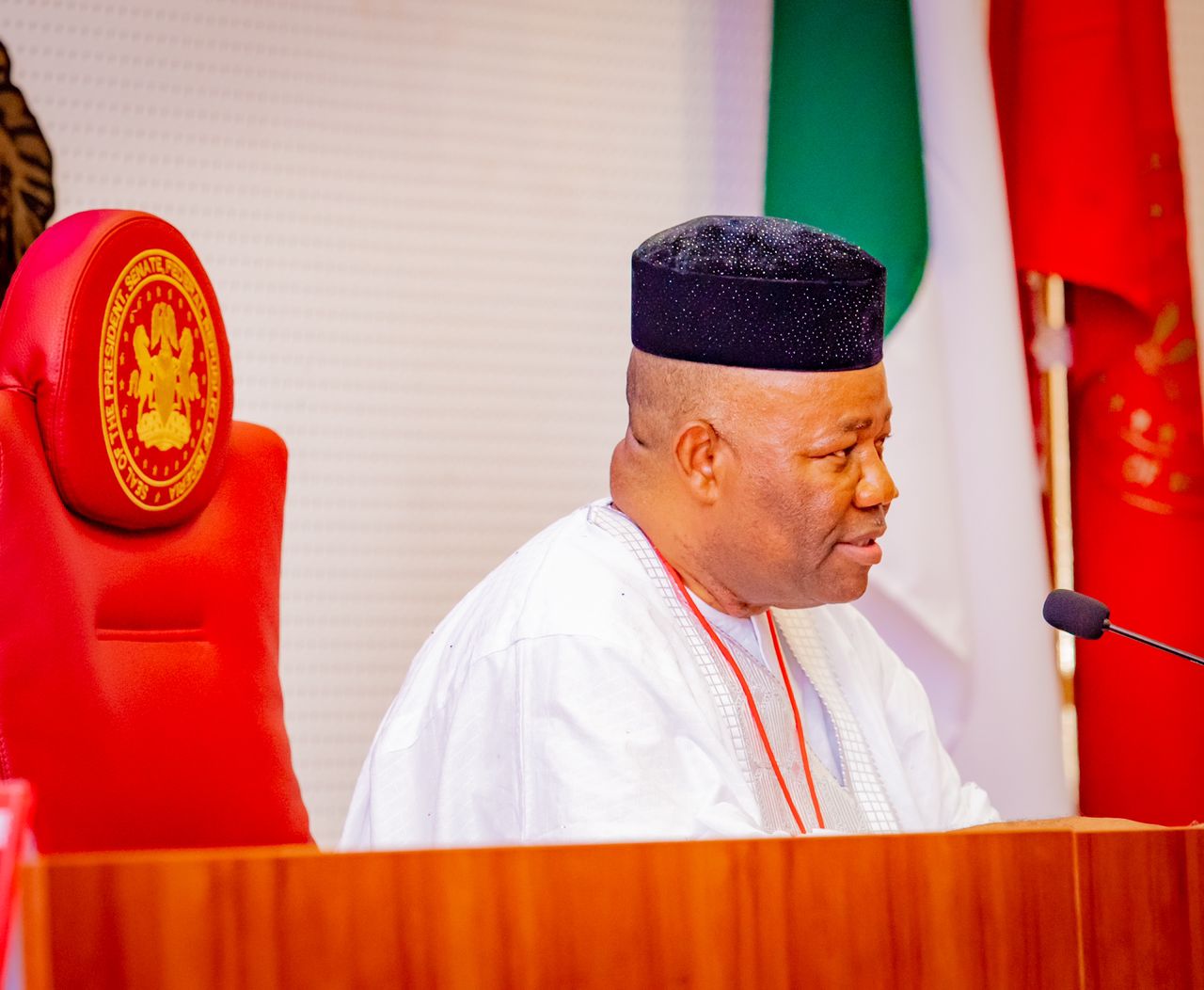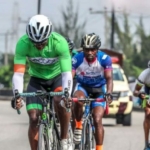
Tempers were said to have risen on Saturday as senators discussed the request made by President Bola Tinubu on the need to send troops to Niger Republic to enforce the resolution of the Heads of States of the Economic Community of West African States for the junta that overthrew President Mohamed Bazoum to restore him to power or face military action.
Senators were said to have been divided on whether to grant approval to the request or shut it down.
It was gathered that many senators from the North were not in support of the move as they argued that doing so would affect the peace of their area.
A source who was privy to the discussions among the senators, who met behind closed doors, said lawmakers from seven northern states, which share border with Niger Republic namely; Sokoto, Kebbi, Katsina, Zamfara, Jigawa, Yobe and Borno, vehemently rejected the move.
The source, who spoke on condition of anonymity said, “It was a stormy session with concern on the implications of the war if allowed to start.
“Senators from the North are not in support of the proposed deployment of troops to Niger.
“Some of us were not happy with the coup, especially with the attendant implication for the West African region. We were also not happy with the way the coup plotters were grandstanding because we as a country have been good to them.
“Remember the rail line that the government of President Muhammadu Buhari initiated to the country and the electricity we are supplying them.
“So, we were angry with the way the new military ruler and his men were talking to Nigeria and other West African countries with contempt.
“We all discussed the situation in Mali, Burkina Faso and Libya, which may affect the seven northern states and the entire country if military force is used.”
He said when it was becoming difficult to reach a consensus, it was then suggested that the President of the Senate, Godswill Akpabio, and the leadership of the Senate meet with Tinubu to appeal that diplomacy be used to solve the problem.
“We don’t want war and at the same time, we aren’t happy with the grandstanding of these soldiers from our neighbour. We know our soldiers are battle-ready and will win the war and install the deposed President, but how far can we go by imposing a willing leader on unwilling citizens?” the source added.
Thereafter, the Senate advised Tinubu, who is also the Chairman of ECOWAS, to explore diplomatic and political options to address the issue of the coup in Niger Republic.
The Senate in a resolution read by Akpabio after a two-hour closed-door session, also explained that the President did not ask the upper legislative chamber to approve that the “country should go to war.”
Tinubu had in a letter to the Senate on Friday sought its support on the deployment of military personnel to Niger Republic.
He also sought the backing of the legislature on the cutting off of electricity supply to the neighbouring country.
Tinubu had last Sunday met with some fellow ECOWAS leaders to discuss appropriate ways to restore democracy in Niger.
The leaders of the West African regional bloc met to discuss sanctions to be placed against the military personnel who toppled President Mohamed Bazoum on July 26, 2023.
The Senate, however, in its resolutions on Saturday, “Called on the President of the Federal Republic of Nigeria, who is also the chairman of ECOWAS, to further encourage other leaders of ECOWAS to strengthen political and diplomatic options and other means with a view to resolving the political impasse in Niger Republic.
“The National Assembly also advised ECOWAS under the leadership of President Tinubu to resolve the political situation in Niger and return the country to democratic governance in the near future.”
It also added that “the leadership of the Senate is mandated to further engage with the President, who is also the Commander-in-Chief, on behalf of the Senate and the entire National Assembly on how best to resolve the issue in view of the hitherto existing cordial relationship between Nigeriens and Nigerians.”
It also called on the ECOWAS parliament to “rise to the occasion by equally condemning this coup and also proffer solutions to resolving this impasse as soon as possible.”
The Red Chamber commended Tinubu and other heads of state of the other states of ECOWAS for their prompt response and the positions taken on the development in the Niger Republic.
Akpabio clarified, “President Tinubu via his correspondence has not asked for the approval of the parliament of this Senate to go to war as erroneously suggested in some quarters.
“Rather, Mr President has expressed a wish to respectfully solicit the support of the National Assembly in the successful implementation of the resolutions of the ECOWAS as outlined in the said communication.”
ECOWAS defence chiefs
Meanwhile, ECOWAS defence chiefs in separate meetings have made far-reaching decisions aimed at resolving the political stalemate in Niger.
A top intelligence source told PRNigeria that the resolutions of the defence chiefs emphasised dialogue, and economic and security sanctions as necessary steps to be explored at resolving the crisis before any other action could be contemplated.
“The President (Tinubu) didn’t express his personal opinion but the resolutions of ECOWAS leaders, which he chaired as the current rotational chairman. The resolutions include further engagements to resolve the political logjam,” the intelligence source, who spoke on condition of anonymity added.
Nigeria’s Chief of Defence Staff, General Chris Musa, is the chairman of the region’s defence chiefs.
In attendance at the ECOWAS Extraordinary Session held in Abuja over the Niger crisis were Presidents Umaro Sissoco Embalo of Guinea-Bissau, Alassane Ouattara of Cote D’Ivoire, Faure Gnassingbe of Togo, Macky Sall of Senegal, Patrice Talon of Benin, and Nana Akufo-Addo of Ghana, while Cape Verde and Liberia were represented by their foreign affairs ministers, Luís Tavares and Dee-Maxwell Kemayah Sr., respectively.
The ECOWAS defence chiefs resolved to place dialogue at the forefront of the regional body’s approach to resolving the crisis in Niger Republic.
While reading the communiqué from their meeting, Musa said the region’s defence chiefs acknowledged the need for a comprehensive approach that encompassed political, security and diplomatic dimensions.
Military chiefs from Nigeria, Benin, Ghana, Togo, Sierra Leone, Liberia, The Gambia, Côte D’Ivoire, Cape Verde, Senegal and Guinea Bissau attended the meeting at the Defence Headquarters in Abuja.
Musa noted that the committee recognised the gravity of the situation and the urgent need for a well-coordinated response.
He said, “We have acknowledged the need for a comprehensive approach that encompasses political, security and diplomatic dimensions. It is imperative that we translate our deliberations into concrete actions that can effectively address the crisis and prevent a recurrence in the future.
“Firstly, we must emphasize the importance of upholding democratic principles and the rule of law. The coup in the Niger Republic represents a blatant disregard for these fundamental principles that underpin our regional integration and stability. We must unequivocally condemn such actions and demonstrate our unwavering commitment to democracy.
“Secondly, we must strengthen our regional security architecture and enhance our collective response to security challenges. The coup in the Niger Republic has highlighted the fragility of our region and the need for a robust and proactive security framework. We must enhance intelligence sharing, joint training exercises and capacity-building initiatives among our defence and security forces to effectively combat threats to our collective security and enhance interoperability.
“Thirdly, we must intensify our diplomatic efforts to engage with all relevant stakeholders. Dialogue and negotiation should be at the forefront of our approach to resolving the crisis in the Republic of Niger. We must engage with the transitional authorities, civil society organisations and other key actors to foster an inclusive and peaceful transition process. ”
Musa urged the defence chiefs to ensure that their expertise and resources are channelled to tackle insecurity in the region.
Also speaking, the Commissioner for Political Affairs, Peace and Security, ECOWAS, Ambassador Abdel-Fatau Musah, said the authority of the Heads of State of ECOWAS was committed to eradicating all forms of unconstitutional takeover of power in the sub-region.
Musah said the threat of military takeover in West Africa had become pronounced in recent times, adding that efforts must be made to address the situation if the region must not become the laughing stock of Africa and the world.
He said the meeting of the defence chiefs was guided by the protocol relating to the mechanism for conflict prevention, management, resolution, peacekeeping and security, which was adopted in 1999 and signed up by all member states in 2001.
JNI cautions Tinubu
Similarly, the Jama’atu Nasril Islam has warned the President against embarking on a war with the junta to restore democratic governance in the Republic of Niger.
The JNI is led by the Sultan of Sokoto, Alhaji Muhammad Sa’ad Abubakar lll, who is also the spiritual leader of Nigerian Muslims.
The organisation, through its Secretary-General, Prof Khalid Abubakar Aliyu, gave the warning in a statement released to journalists in Kaduna on Saturday.
In the statement titled, ‘Military action against Niger Republic: A call for caution’, the JNI warned that military intervention could have unintended consequences that might impact the peace and stability of both nations.
It urged all stakeholders to prioritise more diplomatic and political conciliation and collective efforts to the crisis.
The statement noted that the JNI believed strongly that dialogue, cooperation and negotiation were the most effective means to establish lasting peace and stability in the region.
It added that it was equally essential that the international community, including ECOWAS, continued to engage in peaceful diplomatic discussions aimed at finding a resolution.
The statement read in part, “The Jama’atu Nasril Islam (JNI), representing the collective voice of the Muslim Ummah, expresses its deep concern and censure of power from a democratically elected President Bozoum through a military coup in Niger Republic.
“We firmly note the relevance of upholding democratic principles and the rule of law to fostering stability, development and steady progress within nations, which are without doubt cornerstones for good governance, because they (democratic principles and rule of law) prevent arbitrary use of force and power, ensure consistency with international human rights, norms and standards.
“The JNI, therefore, commends the efforts so far undertaken by the Nigerian government, particularly the initiation of a dialogue process aimed at resolving the crisis in Niger Republic. While this attempt may not have yielded the desired results, it demonstrates Nigeria’s commitment to peaceful resolutions.
“We acknowledge that dialogue is an invaluable tool in preventing further bloodshed and instability, within the Sahel region, already beset with many political and security uncertainties.
“Nevertheless, we wish to raise a word of caution against the pursuit of military action as a means to restoring democracy. The interlaced landscape of the northern states of Nigeria and the Republic of Niger necessitates a more circumspect and thoughtful action and/or approach.”
It added, “With several Nigerian states sharing borders with Niger Republic, military intervention could have unintended consequences that may impact the peace and stability of both nations.
“The JNI, therefore, calls upon all stakeholders to prioritise more diplomatic and political conciliation and collective efforts to the crisis. We believe strongly that dialogue, cooperation and negotiation are the most effective means to establish lasting peace and stability in the region.
“It is equally essential that the international community, including the Economic Community of West African States, continues to engage in peaceful diplomatic discussions aimed at finding a resolution please.”
Ex-generals warn President
Some retired military generals have warned Tinubu to tread with caution with regard to the involvement of Nigerian troops in the battle against the junta in Niger Republic.
A former Chief of Army Operations, Training and Plans, Major General Ishola Williams (retd.), said Tinubu must be careful not to be caught in the web of the current crisis in Niger, which was beyond a coup.
He urged the President to concentrate more on Nigerians and mediate diplomatically in Niger Republic.
Williams stated, “Today is the last day given to the Nigerien junta by Tinubu to surrender. What bothers me very much is that I don’t understand why Tinubu is very much afraid of coups in other West African countries.
“He should be concerned about his own country to make sure that coups do not happen in Nigeria. This is because charity begins at home. So, even though he is the chairman of ECOWAS, there is a limit to what he can do. This is because ECOWAS is not yet a political federation. ECOWAS is a membership of sovereign states, and these states decide what they want to do with their countries.”
Williams also noted that when the ousted President of Niger was about to be inaugurated, there was an attempted coup, which the immediate past President managed to stop so that the inauguration could take place.
He added, “This means that the military supported by politicians did not want the current president to be the president of Niger. Why? I don’t know, but the Nigeriens themselves can explain. Some may say that he comes from a very minority ethnic group in Niger.
“This is not something that President Tinubu must bother Nigeria with. It is a messy situation. Tinubu has an obligation not to act first before giving a thought.
“Even if he storms Niger, it will then become a human rights matter because the troops cannot just execute the junta. There are a lot of international conventions against that.”
He also urged Tinubu and ECOWAS to mediate quietly with the junta, because “forcing them to surrender will affect Nigeria even more than it may affect Niger.”
A retired Brigadier-General and the Osun State Commander, Amotekun Corps, Bashir Adewinbi, said dialogue remained the best way to resolve the issue in Niger.
He added that the military leaders might reconsider their stance when the defence chiefs meet them.
In an interview with one of our correspondents, Adewinbi said, “Dialogue is the best way to resolve this issue. I must commend the defence chiefs in the region for tolling that part.
“I believe that if the head of the junta in Niger fails to listen to delegates sent to the country, he may probably listen to the regional defence chiefs if they meet with him. War is not a good thing.”
Also commenting, a former Army spokesperson, Brigadier General Sani Usman (retd.), said the region could not afford to go to war over the coup in Niger.
He added that military action would lead to a humanitarian crisis and could further compound the insecurity confronting the region
Usman said, “Already, they are pursuing the right course of action in diplomacy and sanctions to mount pressure on the junta. Military action is not advisable for obvious reasons of the attendant humanitarian crises and aggravated security problems.
“Constructive engagement is the answer. They should mount pressure for the release of the ousted President and come up with an agreeable transition plan. Neither ECOWAS nor Niger can afford a war. “
On his part, a former Chief of Defence Staff, General Alexander Ogomudia (retd), noted that with his vast experience, there was a need for caution.
“I think there should be caution,” he simply said.





